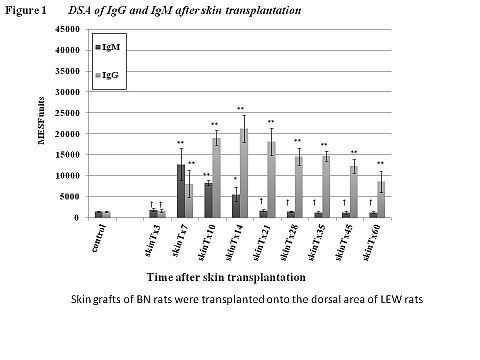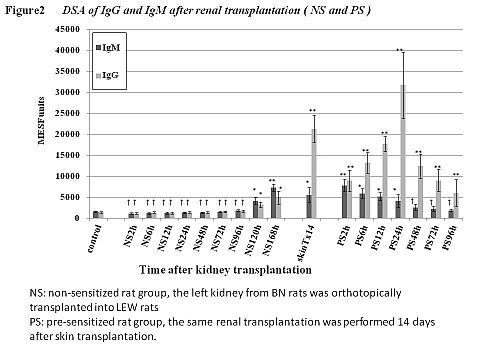Sequential Analysis of Donor-Specific Antibodies and Pathological Findings in Acute Antibody-Mediated Rejection: A Rat Renal Transplantation Model
Urology, Tokyo Women's Medical University, Shinjuku-ku, Tokyo, Japan
Kidney Center, Tokyo Women's Medical University, Shinjuku-ku, Tokyo, Japan
Yamaguchi Pathological Research Institute, Tokyo, Japan
Meeting: 2013 American Transplant Congress
Abstract number: B863
Background. Although clinical evidence regarding antibody- and complement-mediated injury in renal transplantation is available, the mechanism of acute antibody mediated rejection, AAMR, remains unclear. Therefore, it is important to understand the sequential kinetics of antibodies and complement components.
Methods. We pre-sensitized recipient rats by skin transplantation. Anti-donor-specific (DSA) IgG levels peaked 2 weeks after transplantation.

These rats then underwent renal transplantation from the same donor strain on the 14th day. In another recipient rat group, sensitized serum was transfused at the time of renal transplantation. We evaluated the sequential pathological findings based on the Banff classification and the sequential kinetics of DSA-IgG by molecules of equivalent soluble fluorochrome (MESF) units.
Results. In this pre-sensitized model, peritubular capillaries (PTC) were already infiltrated by inflammatory cells and stained for C4d 2 h after transplantation. Further, DSA-IgG levels decreased rapidly (Figure 2) and anti-IgG antibody stained glomerular capillaries and PTC in grafts were observed 2 h after transplantation.

In the adoptive transfer group, although PTCs were dilated and stained with C4d immediately after transplantation, AAMR did not progress similarly to in the pre-sensitized group.
Conclusion. In pre-sensitized recipients, alloantibodies and complement components were activated immediately after transplantation. We demonstrated that C4d deposition in PTC can be used to diagnose AAMR and that pre-sensitized DSA production cells are critical for AAMR progression.
To cite this abstract in AMA style:
Kohei N, Tanabe T, Horita S, Omoto K, Ishida H, Yamaguchi Y, Tanabe K. Sequential Analysis of Donor-Specific Antibodies and Pathological Findings in Acute Antibody-Mediated Rejection: A Rat Renal Transplantation Model [abstract]. Am J Transplant. 2013; 13 (suppl 5). https://atcmeetingabstracts.com/abstract/sequential-analysis-of-donor-specific-antibodies-and-pathological-findings-in-acute-antibody-mediated-rejection-a-rat-renal-transplantation-model/. Accessed February 16, 2026.« Back to 2013 American Transplant Congress
